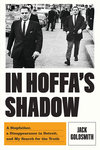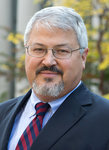

Jack Goldsmith is one of those bread and butter innocuous names. It doesn’t stand out; however, when it is paired with
Stepson of Hoffa disappearance suspect pens book about the case
“stepson of Chuckie O’Brien,” it jumps off the page — or, in this case, the book jacket of “In Hoffa’s Shadow: A Disappearance in Detroit and My Search for the Truth.”
Goldsmith went through most of his life as a conservative lawyer, an appointee of President George W. Bush and a distinguished legal professor at Harvard University. Few except the White House and the FBI knew of his ties to O’Brien.
Goldsmith’s life was turned topsy-turvy in 1975 when he was 12 and Jimmy Hoffa disappeared from a Detroit suburb. Chuckie O’Brien was one of the primary suspects. O’Brien had been Hoffa’s unofficial adopted son and grew into his trusted lieutenant and conduit to organized crime.
When Goldsmith decided to pursue a career as a lawyer, he gave up all ties with his stepfather, something he regrets today.
Goldsmith said he began the process of reconciliation with his father while working in government and learning O’Brien “may have been right about a lot of things regarding government surveillance.”
“He made me think more broadly, and that he may have been right about a lot of things,” Goldsmith said. “I also learned from our conversations how fiercely loyal he was and the importance he played in my life.”
Although O’Brien’s innocence or guilt was never conclusively proven, it haunted the family right up to his recent death. It was that suspicion that spurred Goldsmith to create a wall between his stepfather and himself. It was shortly after leaving his White House post that the two reconciled in 2004.
After hundreds of hours of interviews, Goldsmith was convinced his stepfather had no role in Hoffa’s disappearance, and he was able to talk O’Brien into letting him write a book about the Hoffa-O’Brien relationship and perhaps prove his stepfather’s innocence.
The book does not necessarily accomplish that, but what it does provide is insight into Hoffa’s presidency of the International Brotherhood of Teamsters against the backdrop of the labor and political intrigue of the latter part of the 20th century. We learn about Hoffa’s alleged bribe of Richard Nixon, and how much he despised Bobby Kennedy for his relentless — and sometimes alledgedly illegal — efforts to imprison Hoffa for his relationship with organized crime. We also learn from the book that it was the illegal loans from the Teamster pension fund that built modern-day Las Vegas.
Michigan was especially focused on Hoffa because of his ties to Detroit’s organized crime family, the Giacalones. Vic Giacalone saw O’Brien as an “uncle” due to his Sicilian heritage.
Goldsmith’s at his best when dissecting Kennedy’s “abuses,” and how he “neglected, elided or interpreted away ethical and legal restrictions.” Of this, he knows what he writes. As head of the Bush administration’s Office of Legal Counsel, he often stood in the way of warrantless surveillance.
Taken as a whole, Goldsmith is exceedingly forthright about his stepfather’s flaws, but it is also obvious he has a strong affection for the man who raised him, despite being separated from him for 20 years.
Over the years, it has been easy to be distracted about the truth of who killed Hoffa and why— partially due to all the tips of where his body is purported to be located, including one of the more irrational locations: my hometown, Essexville, Michigan. Coincidentally, in 2003, I was on my way home to visit my mother when — fewer than a couple of yards from where I grew up — I came across a contingent of law enforcement officers with large earth-moving equipment excavating a yard, including a swimming pool. They were looking for Hoffa’s body.
Goldsmith said his stepfather watched the recent Netflix blockbuster “The Irishman,” which provides its own spin on Hoffa’s death. The movie portrays O’Brien, played by Jesse Plemons, as complicit in the kidnapping and murder of Hoffa.
In a January New York Times article, Goldsmith criticized the depiction of his stepfather in the movie as being complicit in the kidnapping and murder of Hoffa. He wrote: “The charge ruined his life.”
He called “The “Irishman” the latest, and “by far the greatest" depiction of the false charge.
“From the time I spent with O’Brien, I concluded he wasn’t involved in the disappearance,” Goldsmith said.
He reasserted that belief most recently on his Feb. 13 Lawfare blog when he wrote in O’Brien’s obituary that the charge is “untrue.”
As an aside, I worked for Elizabeth Howe, director of the Michigan Labor Department, who was the last person, excluding his killers, to see Hoffa alive. She ran into him outside the Machus Red Fox as he was waiting for a ride. She talked to him for a while and then went back inside to retrieve something she left on the table. When she returned Hoffa was gone. She later thought leaving something on the table was more than a lucky break it — may have saved her life.
The one thing we know about Hoffa’s disappearance is if O’Brien knew anything about it he took it, to his grave when he died this year.
Support City Pulse - Donate Today!
Comments
No comments on this item Please log in to comment by clicking here